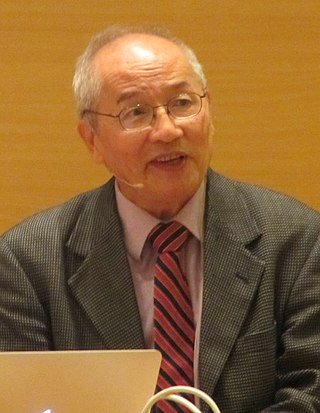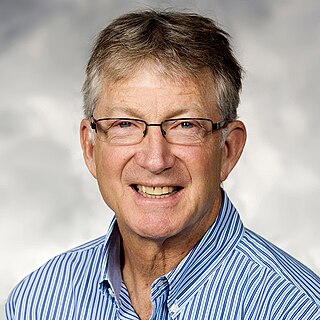Related Research Articles

John Hasbrouck Van Vleck was an American physicist and mathematician. He was co-awarded the Nobel Prize in Physics in 1977, for his contributions to the understanding of the behavior of electronic magnetism in solids.

The Washburn Observatory is an astronomical observatory located at 1401 Observatory Drive on the University of Wisconsin–Madison campus in Madison, Wisconsin, United States. Completed in 1881, it was a major research facility for about 50 years. Today, it is home to the UW-Madison College of Letters and Science Honors Program, while the telescope remains in use by students in introductory astronomy courses and the general public during open houses and viewings.
The Pine Bluff Observatory (PBO) is an astronomical observatory located in the town of Cross Plains, Wisconsin (USA) about 24 kilometers (15 mi) west of Madison. PBO is owned and operated by the University of Wisconsin–Madison (UW-Madison). It opened in 1958, and is mainly used by students and faculty of UW-Madison for instruction and research. PBO also provides a facility for testing new instruments. Recent research conducted at PBO includes measuring the lunar sodium tail, monitoring circumstellar disks around Be stars, and studying the warm ionized medium.
Donald Edward Osterbrock was an American astronomer, best known for his work on star formation and on the history of astronomy.

The Sterling Hall bombing occurred on the University of Wisconsin–Madison campus on August 24, 1970, and was committed by four men as an action against the university's research connections with the U.S. military during the Vietnam War. It resulted in the death of a university physics researcher and injuries to three others.

Frank Hsia-San Shu was a Chinese-American astrophysicist, astronomer, and author. He served as a Professor Emeritus at the University of California, Berkeley and University of California, San Diego. He is best known for proposing the density wave theory to explain the structure of spiral galaxies, and for describing a model of star formation, where a giant dense molecular cloud collapses to form a star.
Amy J. Barger is an American astronomer and Henrietta Leavitt Professor of Astronomy at the University of Wisconsin–Madison. She is considered a pioneer in combining data from multiple telescopes to monitor multiple wavelengths and in discovering distant galaxies and supermassive black holes, which are outside of the visible spectrum. Barger is an active member of the International Astronomical Union.

The University of Wisconsin–Madison School of Education is a school within the University of Wisconsin–Madison. Although teacher education was offered at the university's founding in 1848, the School was officially started in 1930 and today is composed of 10 academic departments. U.S. News & World Report in its 2023 Best Grad School rankings rated UW-Madison's School of Education No. 5 among public institutions. In addition, U.S. News ranked nine education specialty areas, and UW–Madison’s School of Education is the only school in the nation to have a top-10 ranking in all nine — including the No. 1-ranked Educational Psychology program. Diana Hess succeeded Julie Underwood as the school's ninth dean in August 2015.
The Irving Langmuir Prize in Chemical Physics is awarded annually, in even years by the American Chemical Society and in odd years by the American Physical Society. The award is meant to recognize and encourage outstanding interdisciplinary research in chemistry and physics, in the spirit of Irving Langmuir. A nominee must have made an outstanding contribution to chemical physics or physical chemistry within the 10 years preceding the year in which the award is made. The award will be granted without restriction, except that the recipient must be a resident of the United States.

The University of Wisconsin–Madison is a public land-grant research university in Madison, Wisconsin. UW–Madison serves as the official state university of Wisconsin and the flagship campus of the University of Wisconsin System, while also earning recognition as a "Public Ivy". Founded in 1848 when Wisconsin achieved statehood, UW–Madison was the first public university established in Wisconsin and remains the oldest and largest public university in the state. UW–Madison became a land-grant institution in 1866. The 933-acre (378 ha) main campus, located on the shores of Lake Mendota, includes four National Historic Landmarks. The university also owns and operates the 1,200-acre (486 ha) University of Wisconsin–Madison Arboretum, located 4 miles (6.4 km) south of the main campus, which is also a National Historic Landmark.
The Morgridge Institute for Research is a private, nonprofit biomedical research institute in Madison, Wis., affiliated with the University of Wisconsin–Madison. The institute works to improve human health by conducting, enabling and translating interdisciplinary biomedical research. Research in regenerative biology, virology, medical devices and core computational technology is currently underway.
Blakesley Burkhart is an astrophysicist. She is the winner of the 2017 Robert J. Trumpler Award awarded by the Astronomical Society of the Pacific, which recognizes a Ph.D. thesis that is "particularly significant to astronomy." She also is the winner of the 2019 Annie Jump Cannon Award in Astronomy and the 2022 winner of The American Physical Society's Maria Goeppert-Mayer Award. The awards both cited her work on magnetohydrodynamic turbulence, and for developing innovative techniques for comparing observable astronomical phenomena with theoretical models.

James L. Skinner is an American theoretical chemist. He is the Joseph O. and Elizabeth S. Hirschfelder Professor Emeritus at the University Wisconsin-Madison. He is also a member of the Scientific Advisory Board of the Welch Foundation. Most recently, Skinner was the Crown Family Professor of Molecular Engineering, professor of chemistry, director of the Water Research Initiative and deputy dean for faculty affairs of the Pritzker School of Molecular Engineering at the University of Chicago. Skinner is recognized for his contributions to the fields of theoretical chemistry, nonequilibrium statistical mechanics, linear and nonlinear spectroscopy of liquids, amorphous and crystalline solids, surfaces, proteins, and supercritical fluids. Skinner is the co-author of over 230 peer-reviewed research articles.
Linda Siobhan Sparke is a British astronomer known for her research on the structure and dynamics of galaxies. She is a professor emerita of astronomy at the University of Wisconsin–Madison, and Explorers Program Scientist in the NASA Astrophysics Division.
Charles Elwood Mendenhall was an American physicist and professor at the University of Wisconsin–Madison.
Alexandre Lazarian is an astrophysicist. He is a professor of astronomy at the University of Wisconsin–Madison with a joint appointment at the Department of Physics. He is a fellow of the American Physical Society.
Vernon Duane Barger is an American theoretical physicist, specializing in elementary particle physics.
Doerte Blume is a physicist working at Washington State University.
Leanne Carolyn Pitchford is a retired physicist known for her work on the numerical modeling of low-temperature plasma, and in the LXCat project for open exchange of low-temperature plasma data. Educated in the US, she worked in France as a director of research for the French National Centre for Scientific Research (CNRS), affiliated with the Laboratoire Plasma et Conversion d’Energie (Laplace) at the University of Toulouse.

Gary Shiu is a Chinese-American theoretical physicist who is a professor of physics at the University of Wisconsin-Madison. His research spans cosmology, particle physics, and string theory. He has made significant contributions to both fundamental and phenomenological aspects of string theory. He is well known for his work in constructing models of particle physics and cosmology from string theory, and in elucidating experimental and observational consequences of fundamental physics. He brought string theory research to the University of Wisconsin-Madison and was involved in the founding of the Theoretical and Computational Cosmology Group and the AI ∩ Universe Initiative.
References
- ↑ Lin, Chun Chia (2008). "Chun Lin" (Interview). Interviewed by Gary Cameron. Dallas, Texas: American Institute of Physics. Retrieved 23 July 2023.
- ↑ Chun Chia Lin at the Mathematics Genealogy Project
- 1 2 3 "1996 Will Allis Prize for the Study of Ionized Gases Recipient". American Physical Society. Retrieved 23 July 2023.
- 1 2 3 "OU receives gifts for physics building". Journal Record. 9 March 2016. Retrieved 23 July 2023.
- ↑ "APS fellow archive". American Physical Society. Retrieved 23 July 2023.
- ↑ "Chun C Lin". University of Wisconsin–Madison Department of Physics.
- ↑ "Board of Visitors: Chun C. Lin". University of Oklahoma Department of Physics and Astronomy. Retrieved 23 July 2023.
- ↑ Howard, Katelyn (25 July 2018). "Cosmic upgrades: OU to open new physics building". Journal Record. Retrieved 23 July 2023.
- ↑ "Lin Hall Dedication Set for Oct. 13". University of Oklahoma. 2018. Retrieved 29 July 2023.